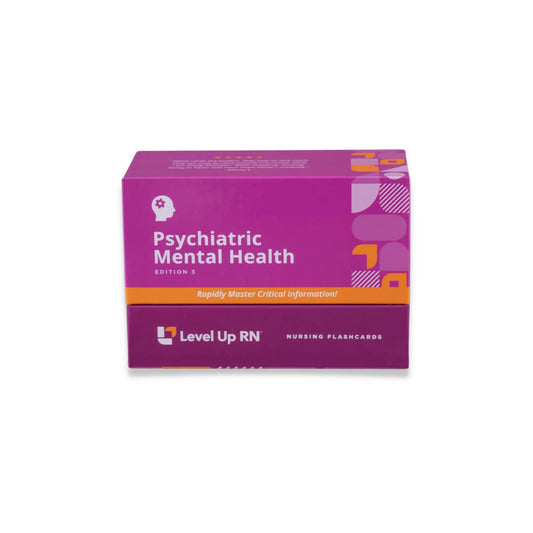In this video/article, we cover Alzheimer's disease and the differences between dementia and delirium.
This series follows along with our Psychiatric Mental Health Nursing Flashcards which are intended to help RN and PN nursing students study for nursing school exams, including the ATI, HESI, and NCLEX.
Alzheimer's disease
Alzheimer's disease is gradual, irreversible dementia that results in memory problems, judgment issues, and changes in personality. Neurons are specialized cells in the nervous system (which includes the brain) that process and transmit information, including thought, memory, and language. Though the exact mechanisms are unknown, Alzheimer's damages neurons and other brain areas.
Risk factors for Alzheimer's
Risk factors for Alzheimer's disease include older age, a family history of Alzheimers, and cardiovascular disease.
Alzheimer's disease signs and symptoms
Symptoms of Alzheimer's disease will vary depending on whether the patient is in early-, moderate-, or late-stage Alzheimer's. There are also some general signs of Alzheimer's disease that may occur regardless of its stage.
Early-stage Alzheimer's
Symptoms of early-stage Alzheimer's include forgetfulness, short-term memory loss, and mild cognitive impairment.
Moderate-stage Alzheimer's
Symptoms of moderate-stage Alzheimer's disease include disorientation, agitation, as well as incontinence and wandering. People with moderate-stage Alzheimer's disease typically require help with their ADLs (activities of daily living).
Late-stage Alzheimer's
During late-stage Alzheimer's disease, patients will become bedridden, lose their verbal and motor skills, and experience dysphagia (difficulty swallowing)
Other signs and symptoms of Alzheimer's
Other signs and symptoms of Alzheimer's disease that may occur in any stage include confabulation, preservation, and sundowning.
Confabulation
Confabulation is the creation of false memories. It is important to understand a patient who exhibits confabulation is not purposefully lying or intending to deceive anyone. It is a compensatory mechanism that happens with Alzheimer's to fill in gaps in memory.
Preservation
Preservation is another symptom of dementia. This is where the patient repeats words, phrases, or gestures over and over again.
Sundowning
Sundowning is an increase in agitation or aggression in the evening that often presents with Alzheimer's. In this video, Cathy points out that if you end up working the night shift on a med-surg floor or in a SNF or LTAC, you are pretty likely to see sundowning in action. A patient may be very calm and agreeable during the day, but in the evening, agitation and aggression can spike.
Diagnosis of Alzheimer's
Diagnosis of Alzheimer's disease includes a review of the patient's symptoms, memory and thinking tests, as well as ruling out underlying causes of the patient's symptoms. A definitive diagnosis of Alzheimer's would only come after a brain examination after the patient's death.
Alzheimer's treatment
Treatment options for Alzheimer's disease include medications like memantine and donepezil, which can help improve a patient's cognition. It is theorized that Alzheimer's is associated with the loss of cholinergic neurons, and donepezil is a cholinergic, so it works to stop the loss of the cholinergic neurons. It's important to note that these medications do not cure Alzheimer's disease.
Other medications such as antipsychotics, antidepressants, and anxiolytics can be used to help manage the patient's symptoms.
All of these medications are covered in our Pharmacology - Nursing Flashcards.
Nursing care
Nursing care of a patient with Alzheimer's disease is heavily tested on in nursing school. As a nurse, maintain a structured environment. Provide the patient with short directions, repetition, and frequent reorientation. Overstimulation of patients with Alzheimer's should be avoided. Use of a single-day calendar is recommended. It's also important to maintain a routine toileting schedule.
In terms of home safety, it's important to advise the family or caretaker to remove clutter from the home as well as remove scatter rugs, which can be a tripping hazard. Cathy points out that nursing school exams are obsessed with scatter rugs — so remember, no scatter rugs!
Door locks should be installed out of sight and out of patient reach due to wandering behavior. There should be good lighting in the home, particularly over the stairs, and step edges can be marked with colored tape to make it clear where those step edges are—this can help prevent falls.
Differences between dementia and delirium
To understand the difference between dementia and delirium, let's first define them.
Dementia
Dementia is chronic, irreversible confusion that is caused by a neurodegenerative disease, e.g., Alzheimer's disease.
Delirium
Delirium is temporary and reversible confusion that is caused by an underlying disorder such as an electrolyte imbalance or infection.
Onset
Dementia has a gradual onset. Delirium has an acute or sudden onset.
Prognosis
Dementia is chronic, progressive, and irreversible. Delirium is transient (temporary) and reversible.
Cause
Dementia is usually caused by a neurodegenerative disease, e.g., Alzheimer's disease. Delirium can be caused by metabolic disorders, infections, or toxins.
Level of consciousness
Level of consciousness is a patient's level of alertness or arousability. A normal finding is for the patient to be alert.
With dementia, a person's level of consciousness is usually unchanged. With delirium, alterations in levels of consciousness are typically present.
Behavior
In patients with dementia, behavior is typically normal until advanced stages of the disease. In patients with delirium, behavior can be very disturbed. Patients experiencing delirium can be easily distracted and may experience hallucinations and sleep/wake disturbances.


